
John Henry Bonham was an English musician who was the drummer of the rock band Led Zeppelin. Noted for his speed, power, fast single-footed kick drumming, distinctive sound, and feel for groove, he is regarded as one of the greatest and most influential drummers in music history.

Maurice Ernest Gibb was a British musician. He achieved worldwide fame as a member of the pop group Bee Gees. Although his elder brother Barry Gibb and fraternal twin brother Robin Gibb were the group's main lead singers, most of their albums included at least one or two songs featuring Maurice's lead vocals, including "Lay It on Me", "Country Woman" and "On Time". The Bee Gees are one of the most successful pop-rock groups of all time.

Spooky Tooth were an English rock band originally formed in Carlisle in 1967. Principally active between 1967 and 1974, the band re-formed several times in later years.

Gary Malcolm Wright was an American musician and composer best known for his 1976 hit songs "Dream Weaver" and "Love Is Alive". Wright's breakthrough album, The Dream Weaver (1975), came after he had spent seven years in London as, alternately, a member of the British blues rock band Spooky Tooth and a solo artist on A&M Records. While in England, he played keyboards on former Beatle George Harrison's triple album All Things Must Pass (1970), so beginning a friendship that inspired the Indian religious themes and spirituality inherent in Wright's subsequent songwriting. His work from the late 1980s onwards embraced world music and the new age genre, although none of his post-1976 releases matched the same level of popularity as The Dream Weaver.
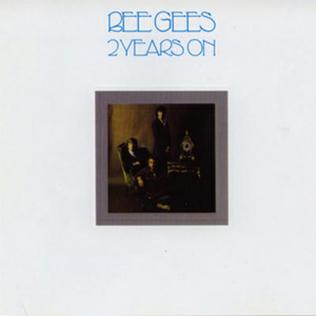
2 Years On is the eighth studio album by the Bee Gees, which reached No. 32 on the US charts. Released in 1970, the album saw the return of Robin Gibb to the group after an earlier disagreement and subsequent split following Odessa. 2 Years On was the first album with drummer Geoff Bridgford, who remained a full-time member of the group until 1972 although he was not pictured on the sleeve. The best-known track is "Lonely Days". Released as the first single by the reunited brothers, it charted high in the US, but peaked at No. 33 in the United Kingdom.

To Whom It May Concern is the tenth album by the Bee Gees. Released in October 1972, it is the follow-up to, and continues the melancholic and personal sound of its predecessor, Trafalgar. The album was recognised as "a farewell to the old Bee Gees" as the album marked the end of an era for the group in several ways: it was their last album to be recorded solely at IBC Studios, in London, their last with conductor and arranger Bill Shepherd, who had guided them since 1967, and their last under their first contract with Robert Stigwood. Some of the songs were old ones finished or rewritten for the occasion.

Michael Alexander Kellie was an English musician, composer and record producer.

Wind of Change is the debut studio album by English guitarist and singer Peter Frampton, released in 1972 by A&M. The album features appearances by Ringo Starr, Billy Preston and Klaus Voormann.
The V.I.P.'s were a British R&B musical ensemble formed in Carlisle, Cumberland, England in late 1963, out of an earlier outfit known as The Ramrods, who had formed in Carlisle in 1960. From a musical reorientation the band changed their name to Art in 1967, and released the album Supernatural Fairy Tales.

"Run to Me" is a song by the Bee Gees, the lead single from the group's album To Whom It May Concern (1972). The song reached the UK Top 10 and the US Top 20.

Witness is a studio album released by Spooky Tooth in 1973. For this recording, original drummer Mike Kellie returned and substantially replaced Bryson Graham. Gary Wright remained the dominant songwriter at this stage of the band's history. Co-lead singer Mike Harrison left the band following the LP's release. The album was remastered and re-released on compact disc (CD) in January 2005 by Repertoire Records.
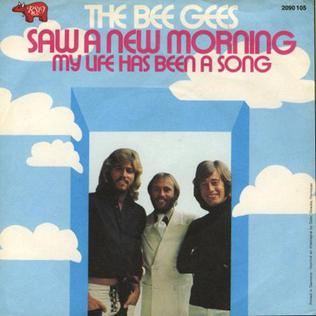
"Saw a New Morning" is the 1973 single released by the Bee Gees. It was also the group's first single released on Robert Stigwood's newly created records label RSO Records. The Bee Gees moved to Los Angeles in 1972 to record the album Life in a Tin Can which was a new direction for the group, who had been recording in England since 1967. The B-side, "My Life Has Been a Song" features lead vocal by Robin Gibb as well as Barry Gibb.
"On Time" is a song written by Maurice Gibb and recorded by the Bee Gees released on 14 January 1972 as the B-side of the single "My World".

How Old Are You? is the second solo album released by British singer Robin Gibb in 1983, thirteen years after his debut Robin's Reign in 1970. The album was not a great success in America and failed to chart in Britain but it did spawn an international hit in "Juliet" which topped the charts in Germany. The album reached No. 6 in Germany. The album was produced by Robin and Maurice Gibb with Dennis Bryon.
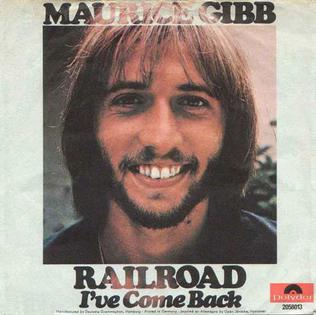
"Railroad" is the first solo single released by Maurice Gibb, best known as a member of the Bee Gees. It was released in April 1970. Like the Bee Gees' songs from 1967 to 1972, the single was released by Polydor in most parts of the world while in the US and Canada it was released by Atco. In Canada it was also released by Atlantic and Cotillion. Gibb did not release a follow-up single until 1984 when he released "Hold Her in Your Hand".
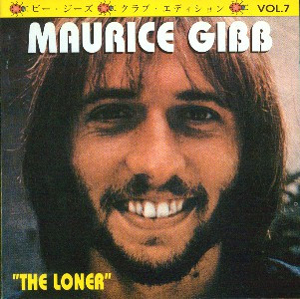
The Loner is an album recorded in late 1969 by Maurice Gibb of the Bee Gees. An album master was compiled on 14 November 1970, but to date The Loner remains unreleased. Bootleg releases with the same title collect additional recordings unrelated to this album.
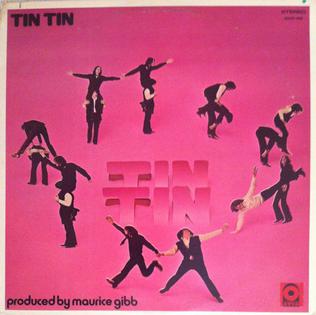
"Tin Tin" is the first studio album by the Australian group Tin Tin, produced by Maurice Gibb.
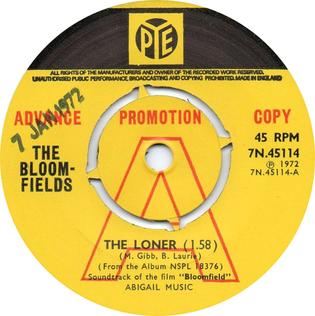
"The Loner" is a song written by Maurice Gibb and Billy Lawrie and originally included on Gibb's The Loner which was not released, although British rock band The Bloomfields covered the song and their version was released internationally, featuring a lead vocal of Billy Lawrie and Maurice Gibb, with Gibb on guitars and bass. They recorded this song for the film Bloomfield, but the film was called The Hero in America. The song starts with a drum fill. Gibb and Lawrie sang together in harmony on the line I'm a loner. On the record, Billy Lawrie was credited as 'B. Laurie'.
"Everybody Clap" is a song written by Maurice Gibb and Billy Lawrie, and was released by Lulu. The single's B-side was "After the Feeling is Gone" in UK and "Goodbye My Love Goodbye" in US. And this single was released in Atlantic Records in UK and Atco Records in US.
Jimmy Stevens was an English singer-songwriter and musician. He was the lead vocalist of the Beathovens. He worked with Maurice Gibb between 1971 and 1973.
















